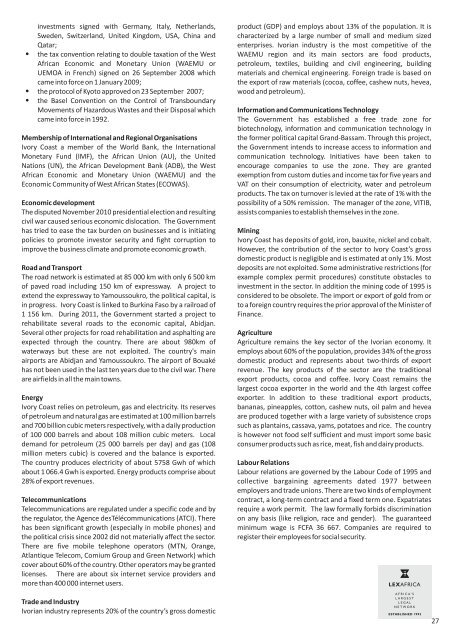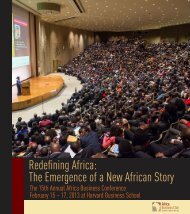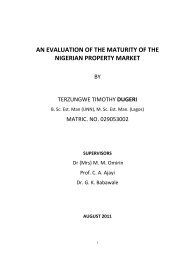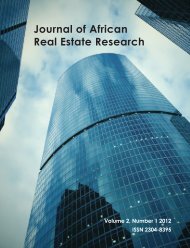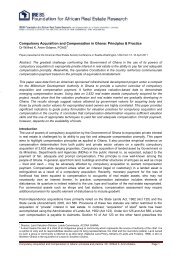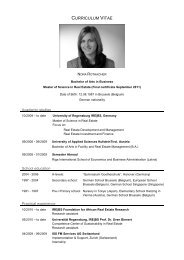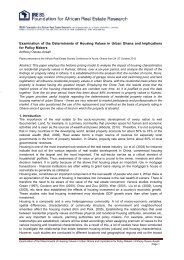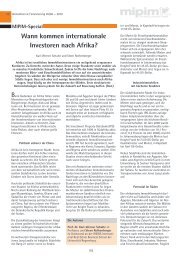Create successful ePaper yourself
Turn your PDF publications into a flip-book with our unique Google optimized e-Paper software.
investments signed with Germany, Italy, Netherlands,Sweden, Switzerland, United Kingdom, USA, China andQatar;the tax convention relating to double taxation of the West<strong>Africa</strong>n Economic and Monetary Union (WAEMU orUEMOA in French) signed on 26 September 2008 whichcame into force on 1 January 2009;the protocol of Kyoto approved on 23 September 2007;the Basel Convention on the Control of TransboundaryMovements of Hazardous Wastes and their Disposal whichcame into force in 1992.Membership of International and Regional OrganisationsIvory Coast a member of the World Bank, the InternationalMonetary Fund (IMF), the <strong>Africa</strong>n Union (AU), the UnitedNations (UN), the <strong>Africa</strong>n Development Bank (ADB), the West<strong>Africa</strong>n Economic and Monetary Union (WAEMU) and theEconomic Community of West <strong>Africa</strong>n States (ECOWAS).Economic developmentThe disputed November 2010 presidential election and resultingcivil war caused serious economic dislocation. The Governmenthas tried to ease the tax burden on businesses and is initiatingpolicies to promote investor security and fight corruption toimprove the business climate and promote economic growth.Road and TransportThe road network is estimated at 85 000 km with only 6 500 kmof paved road including 150 km of expressway. A project toextend the expressway to Yamoussoukro, the political capital, isin progress. Ivory Coast is linked to Burkina Faso by a railroad of1 156 km. During 2011, the Government started a project torehabilitate several roads to the economic capital, Abidjan.Several other projects for road rehabilitation and asphalting areexpected through the country. There are about 980km ofwaterways but these are not exploited. The country's mainairports are Abidjan and Yamoussoukro. The airport of Bouakéhas not been used in the last ten years due to the civil war. Thereare airfields in all the main towns.EnergyIvory Coast relies on petroleum, gas and electricity. Its reservesof petroleum and natural gas are estimated at 100 million barrelsand 700 billion cubic meters respectively, with a daily productionof 100 000 barrels and about 108 million cubic meters. Localdemand for petroleum (25 000 barrels per day) and gas (108million meters cubic) is covered and the balance is exported.The country produces electricity of about 5758 Gwh of whichabout 1 066.4 Gwh is exported. Energy products comprise about28% of export revenues.TelecommunicationsTelecommunications are regulated under a specific code and bythe regulator, the Agence desTélécommunications (ATCI). Therehas been significant growth (especially in mobile phones) andthe political crisis since 2002 did not materially affect the sector.There are five mobile telephone operators (MTN, Orange,Atlantique Telecom, Comium Group and Green Network) whichcover about 60% of the country. Other operators may be grantedlicenses. There are about six internet service providers andmore than 400 000 internet users.Trade and IndustryIvorian industry represents 20% of the country’s gross domesticproduct (GDP) and employs about 13% of the population. It ischaracterized by a large number of small and medium sizedenterprises. Ivorian industry is the most competitive of theWAEMU region and its main sectors are food products,petroleum, textiles, building and civil engineering, buildingmaterials and chemical engineering. Foreign trade is based onthe export of raw materials (cocoa, coffee, cashew nuts, hevea,wood and petroleum).Information and Communications TechnologyThe Government has established a free trade zone forbiotechnology, information and communication technology inthe former political capital Grand-Bassam. Through this project,the Government intends to increase access to information andcommunication technology. Initiatives have been taken toencourage companies to use the zone. They are grantedexemption from custom duties and income tax for five years andVAT on their consumption of electricity, water and petroleumproducts. The tax on turnover is levied at the rate of 1% with thepossibility of a 50% remission. The manager of the zone, VITIB,assists companies to establish themselves in the zone.MiningIvory Coast has deposits of gold, iron, bauxite, nickel and cobalt.However, the contribution of the sector to Ivory Coast’s grossdomestic product is negligible and is estimated at only 1%. Mostdeposits are not exploited. Some administrative restrictions (forexample complex permit procedures) constitute obstacles toinvestment in the sector. In addition the mining code of 1995 isconsidered to be obsolete. The import or export of gold from orto a foreign country requires the prior approval of the Minister ofFinance.AgricultureAgriculture remains the key sector of the Ivorian economy. Itemploys about 60% of the population, provides 34% of the grossdomestic product and represents about two-thirds of exportrevenue. The key products of the sector are the traditionalexport products, cocoa and coffee. Ivory Coast remains thelargest cocoa exporter in the world and the 4th largest coffeeexporter. In addition to these traditional export products,bananas, pineapples, cotton, cashew nuts, oil palm and heveaare produced together with a large variety of subsistence cropssuch as plantains, cassava, yams, potatoes and rice. The countryis however not food self sufficient and must import some basicconsumer products such as rice, meat, fish and dairy products.Labour RelationsLabour relations are governed by the Labour Code of 1995 andcollective bargaining agreements dated 1977 betweenemployers and trade unions. There are two kinds of employmentcontract, a long-term contract and a fixed term one. Expatriatesrequire a work permit. The law formally forbids discriminationon any basis (like religion, race and gender). The guaranteedminimum wage is FCFA 36 667. Companies are required toregister their employees for social security.27


